Key takeaways
- The Natural Disaster Recovery Act provides vital financial and mental health support to individuals and businesses affected by disasters, facilitating quicker recovery.
- In Louisiana, the Act enhances collaboration among state and federal agencies, ensuring efficient resource distribution and community resilience post-disaster.
- The Act promotes preparedness programs to minimize future disaster impacts while addressing challenges such as bureaucratic delays and communication issues.
- Community involvement and support for local businesses are emphasized to stimulate economic recovery and foster a stronger sense of unity among residents.
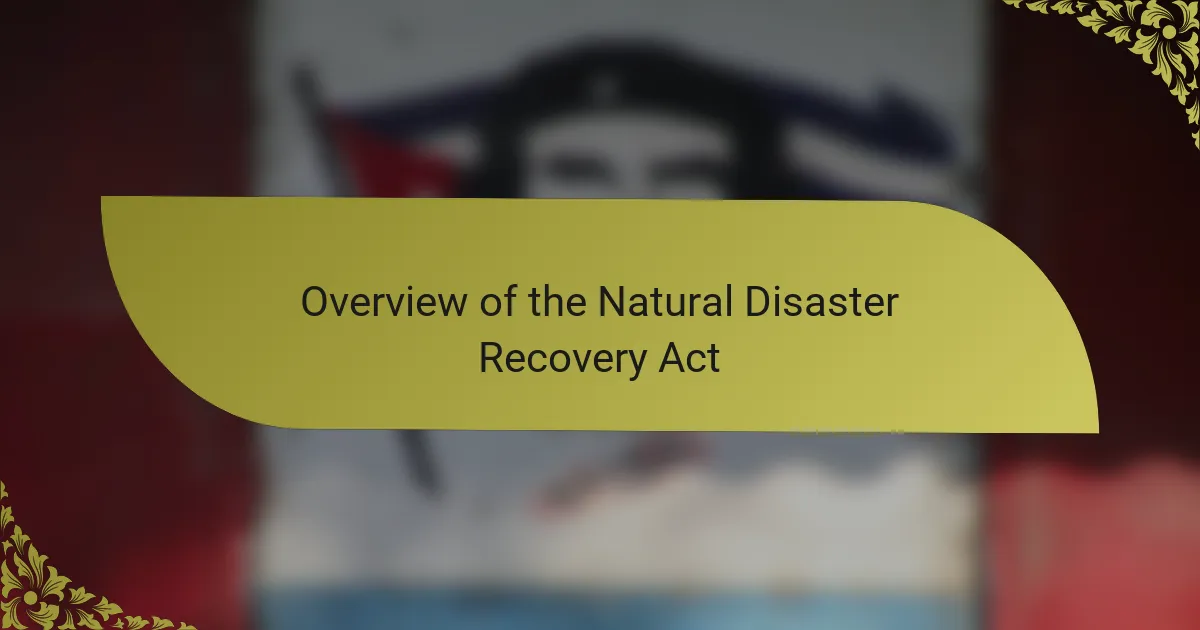
Overview of the Natural Disaster Recovery Act
The Natural Disaster Recovery Act serves as a vital framework for how states, including Louisiana, respond to the devastating effects of natural disasters. I’ve witnessed firsthand how critical such legislation becomes in the aftermath of events like hurricanes and floods, providing immediate assistance to those most affected. It not only outlines the responsibilities of state and local governments but also ensures that residents receive support to rebuild their lives and communities.
- Provides financial assistance to individuals and businesses impacted by natural disasters.
- Streamlines the recovery process, allowing for quicker access to federal aid.
- Enhances collaboration among state and federal agencies in disaster management efforts.
- Encourages preparedness programs to minimize the impact of future disasters.
- Recognizes the importance of mental health support in recovery efforts, reflecting the emotional toll disasters take on individuals and families.

Importance of the Act in Louisiana
The Natural Disaster Recovery Act plays a crucial role in Louisiana, a state that has faced its share of devastating hurricanes and floods. From my perspective, this legislation is like a lifeline for communities striving to rebuild after catastrophic events. I remember the resilience displayed in the aftermath of Hurricane Katrina, and it’s clear how vital rapid recovery strategies are for the emotional and economic wellbeing of our residents.
This Act ensures that resources are available when disaster strikes and provides a structured approach for recovery. Here are some key points on its significance:
- Facilitates quicker access to federal and state funds for rebuilding infrastructure.
- Supports housing assistance programs, helping families return home faster.
- Provides funding for small businesses, which are the backbone of our local economy.
- Encourages community resilience by investing in disaster preparedness initiatives.
- Addresses mental health needs by offering access to support services for affected residents.
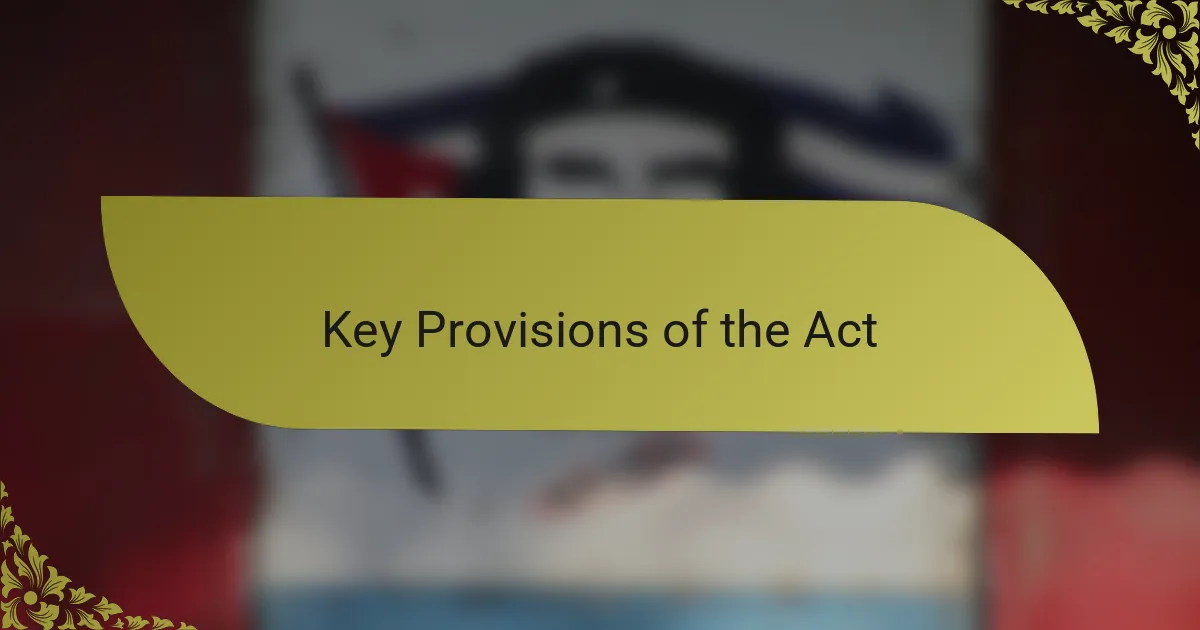
Key Provisions of the Act
The Natural Disaster Recovery Act includes several key provisions that are vital for an effective response to disasters. For instance, one of its most significant aspects is providing financial assistance directly to individuals and businesses impacted by disasters. I’ve seen firsthand how this support can make a world of difference; it’s not just about rebuilding homes but restoring hope for families and entrepreneurs who’ve lost everything.
Another important provision streamlines the process for accessing federal aid, which can often be daunting. When I think about the chaos following a disaster, cutting through red tape can feel like a breath of fresh air. It allows communities to focus on recovery instead of getting bogged down in bureaucratic hurdles. Have you ever experienced the frustration of waiting for aid? It’s something that can add to the trauma, and this Act addresses that by making the process more efficient.
Additionally, the Act emphasizes collaboration among state and federal agencies, which is critical during recovery efforts. I’ve witnessed how teamwork between various levels of government can enhance resource distribution and speed up recovery. It’s comforting to know that when disaster strikes, there’s an organized framework in place, ensuring that every person receives the assistance they need.
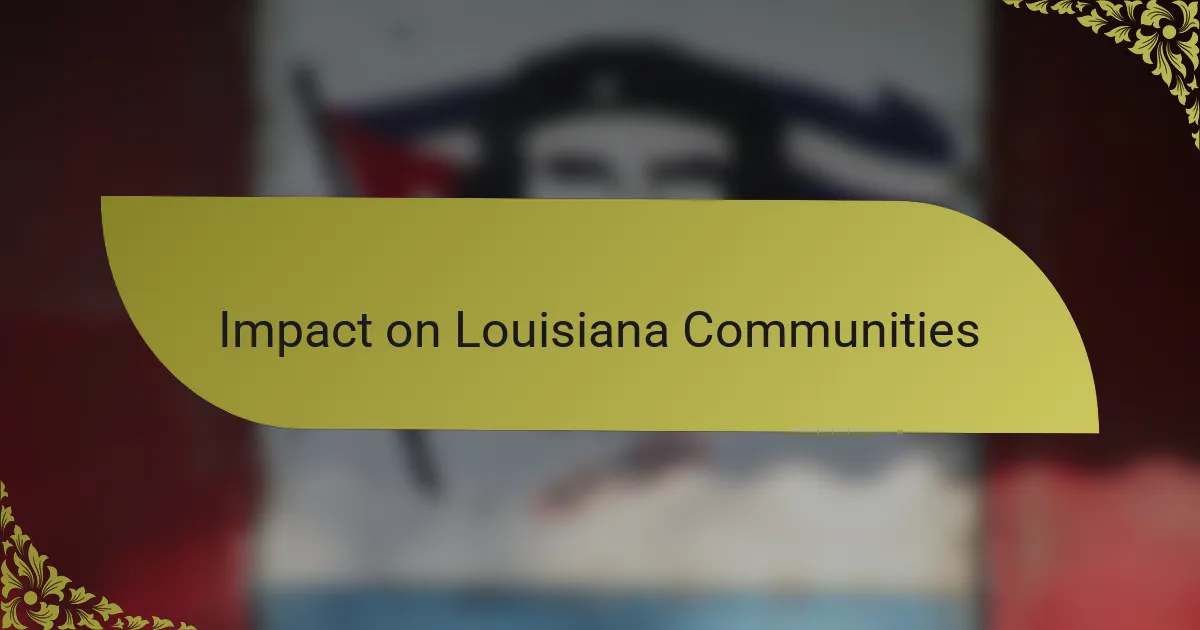
Impact on Louisiana Communities
The Natural Disaster Recovery Act has profoundly impacted Louisiana communities, especially in areas most susceptible to hurricanes and flooding. I’ve seen firsthand how our neighbors come together in the wake of disasters. After Hurricane Katrina, for instance, a sense of unity emerged where volunteers from across the state and beyond helped rebuild homes and restore hope. This spirit of collaboration is something I believe the Recovery Act seeks to nurture, fostering resilience in our local communities.
However, the Act’s implementation isn’t without its challenges. While financial aid is crucial, I’ve observed that the bureaucracy can sometimes slow down the recovery process, making it harder for families to access the resources they desperately need. This delay can be disheartening, especially for those who have already lost so much. Here are some key impacts I’ve noticed:
- Increased funding for disaster relief programs enables faster rebuilding of infrastructure.
- Greater emphasis on community involvement fosters a sense of ownership and resilience.
- Local businesses receive support to recover, which helps stimulate the economy.
- Training programs are created to prepare residents for future disasters, enhancing community preparedness.
- Emotional and mental health resources become more accessible, aiding long-term recovery.
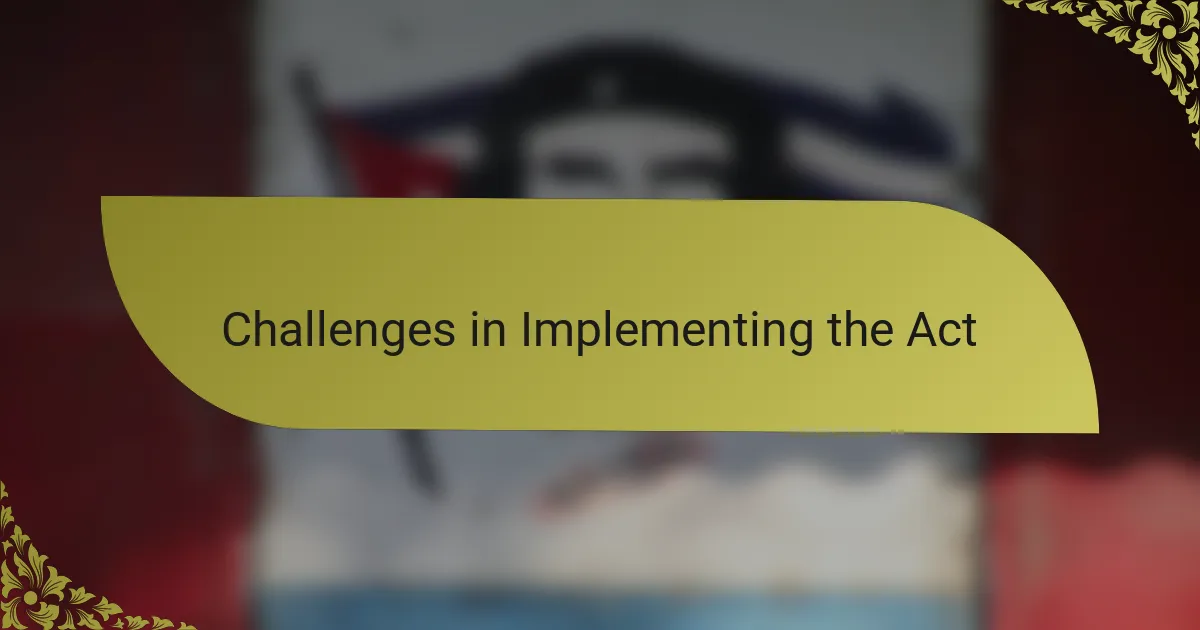
Challenges in Implementing the Act
Implementing the Natural Disaster Recovery Act comes with significant hurdles, one of which is the intricate bureaucracy that often creeps in during a crisis. I’ve seen this firsthand when families are left waiting, sometimes for weeks, to access the aid they so urgently need. Have you ever felt the urgency of a situation but found yourself stuck in red tape? It can be incredibly frustrating, especially when every moment counts in the recovery process.
Another challenge is ensuring effective communication between state and federal agencies. I’ve often found that miscommunication can lead to delays and confusion among those seeking help. For example, during past disasters, I’ve noticed that some residents were unaware of the resources available to them simply because the information wasn’t conveyed clearly. This lack of transparency can leave people feeling lost in a system meant to support them.
Lastly, I believe that while the Act recognizes mental health support as a crucial part of recovery, the implementation of these services often falls short. I’ve spoken to many affected individuals who felt overwhelmed and neglected during their darkest times. It’s vital that our recovery efforts not only focus on physical rebuilding but also prioritize emotional resilience. Addressing these challenges requires us to be proactive and committed to improvement within our disaster response framework.
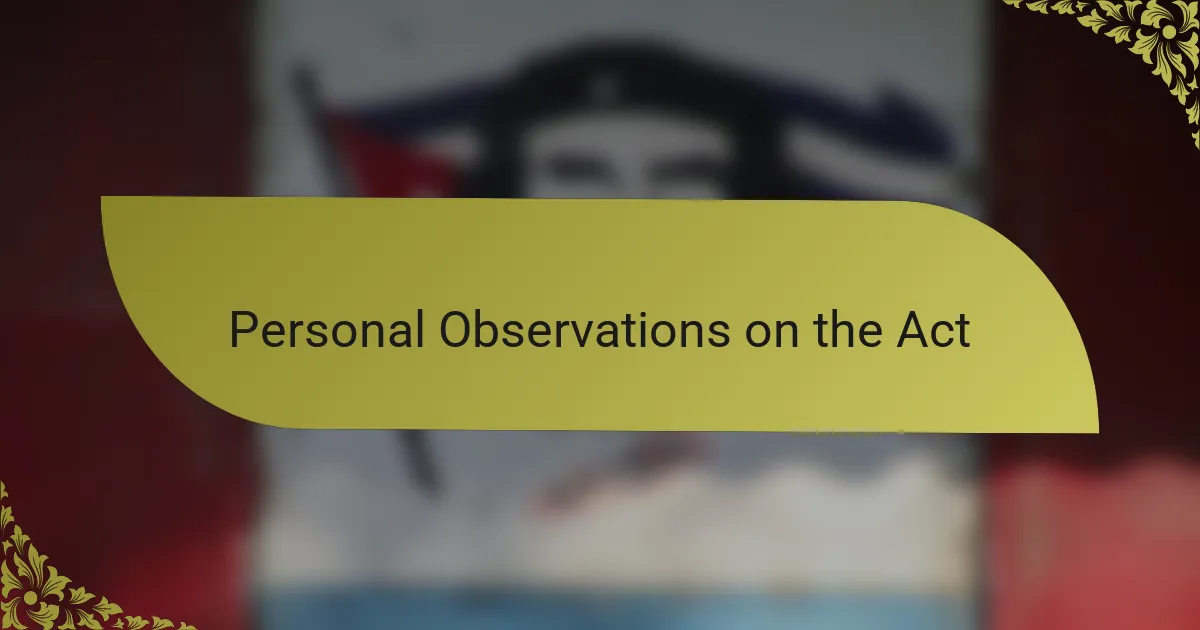
Personal Observations on the Act
The Natural Disaster Recovery Act holds significant importance for Louisiana’s ongoing recovery efforts. From my perspective, the Act not only provides a framework for immediate response but also addresses long-term rehabilitation, which is crucial for communities like ours that frequently face natural disasters. One personal experience that stands out is witnessing neighbors receiving the support they needed to rebuild their homes, which inspires a sense of community resilience.
In my view, the challenges of navigating federal regulations often overshadow the positives of the Act. I recall a neighbor’s struggle with paperwork, which delayed their recovery. It made me realize that while the Act has good intentions, there needs to be more streamlined processes in place to help everyone benefit from the support available.
| Aspect | Natural Disaster Recovery Act |
|---|---|
| Focus | Immediate response and long-term recovery |
| Challenges | Bureaucratic delays and complexity |
| Emotional Impact | Sense of community resilience vs. frustration with processes |